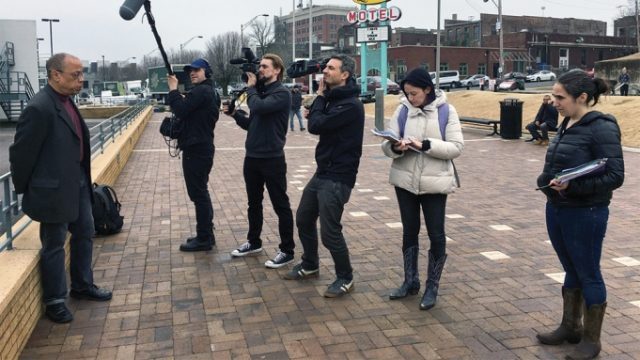
Emily and Sarah Kunstler’s Who We Are: A Chronicle of Racism in America opens third annual Cinematters: NY Social Justice Film Festival (photo courtesy Off Center Media)
CINEMATTERS: NY SOCIAL JUSTICE FILM FESTIVAL
Marlene Meyerson JCC Manhattan online
Carole Zabar Center for Film
January 13-17, $15 per film, $5 for shorts block, $40 all-access pass
mmjccm.org
From the Covid-19 pandemic to the murder of George Floyd to the January 6 insurrection, the last two years have revealed the ever-growing gap and animosity between the two Americas. The third annual Cinematters: NY Social Justice Film Festival, being held virtually January 13-17 by the Marlene Meyerson JCC Manhattan, consists of five features, four shorts, a weekend of service, and a racial justice workshop that explores what has become of the modern-day United States.
The festival opens with Emily and Sarah Kunstler’s Who We Are: A Chronicle of Racism in America, in which civil rights attorney Jeffery Robinson traces the history of racism from slavery to today. The spotlight selection is Iman K. Zawahry’s Americanish, about an immigrant trying to make her way in Jackson Heights. The festival closes with John Maggio’s A Choice of Weapons: Inspired by Gordon Parks, in which such figures as LaToya Ruby Frazier, Spike Lee, Anderson Cooper, Ava DuVernay, and Kareem Abdul-Jabbar discuss the life and legacy of photographer Gordon Parks. Also being shown are Christi Cooper’s Youth v Gov, about young activists taking on the US government, and Jeff Adachi and Chihiro Wimbush’s Ricochet, which tells the story of an undocumented immigrant accused of murder in San Francisco. All screenings will be followed by a live Zoom Q&A with the filmmakers and other participants.
“These films are not just entertainment. Cinematters celebrates the power of film as a vehicle for social change, with some of the most important films of the year,” Carole Zabar Center for Film director Isaac Zablocki said in a statement. “These films shine a light on dark areas and bring action where our society needs movement.”
In addition to the screenings, Repair the World Harlem is sponsoring an MLK Weekend of Service with the East Harlem Tutorial Program on January 16-17, and there will be an allyship workshop on Monday at 3:30.
MELTDOWN IN DIXIE (Emily Harrold, 2021)
January 13-17, $5
Live Zoom Q&A January 17, 2:00
www.meltdownindixie.com
When Tommy and Debbie Daras first bought avowed racist Maurice Bessinger’s popular barbecue restaurant in Orangeburg, South Carolina, transforming it into Edisto River Creamery & Kitchen — home of the Double Dog Dare — the couple was not alarmed by the Confederate flag that flew on the tiny far corner of the parking lot, accompanied by a stone monument honoring soldiers who fought for the South in the Civil War. Tommy saw it as part of the area’s history, even as he did not believe in what it stands for.
After the June 2015 mass shooting that killed nine Blacks attending a Bible study class at Mother Emanuel Church in Charleston, the Sons of Confederate Veterans put up a much bigger flag, as if in support of the murders, leading Tommy to change his mind; he wanted the memorial gone. But as director and producer Emily Harrold shows in the forty-minute documentary Meltdown in Dixie, racism and fear are alive and well in Orangeburg, a city where more than sixty percent of the residents are people of color and that suffered its own race massacre in 1968 over the integration of a bowling alley. As the Darases and their lawyer, Justin Bamberg, go to the zoning board and the courts to have the flag and memorial removed, they are challenged every step of the way by Sons of Confederate Veterans Camp 842 Lt. Commander Buzz Braxton and their attorney, Lauren Martel.
“White supremacy has its roots everywhere; Orangeburg is no different,” Bamberg points out. Meanwhile, Braxton proclaims that Robert E. Lee was “probably the greatest man to ever walk the face of this Earth,” defends his use of the N-word, says the slave trade was good for African Americans, and participates in Civil War reenactments that portray the southern army as heroes and patriots. Harrold gives equal time to both sides of the argument, letting everyone share their views without judgment.

Documentary follows heated battle over Confederate monument in Orangeburg, South Carolina
Meltdown in Dixie gets to the heart of the controversy over Civil War monuments without making it about Democrats vs. Republicans or even whites against Blacks; in many ways, Tommy represents a significant section of America that is caught in between the current reevaluation of history that is going on in schools and small towns across the country. He admits to having had the image of a Confederate flag on his car when he was a professional racer but also says he is following in the footsteps of his father, who he proudly explains didn’t have a racist bone in his body.
“When I bought the creamery, I saw it was in a beautiful park — I said, what’s not to like. But if I could rewind this whole situation, I would have never came to South Carolina in the first place,” he acknowledges. It’s hard to blame him for thinking that.
Meltdown in Dixie is available in a shorts block with Patrice D. Bowman’s Under the Sun After the Wind, Mark Decena’s Heal Thy Neighbor: Denver, and Melissa Gira Grant and Ingrid Raphael’s They Won’t Call It Murder. In conjunction with MLK Day, there will be a live Zoom Q&A on January 17 with Bowman, Harrold, and others, moderated by arts and culture critic Jo Livingstone.